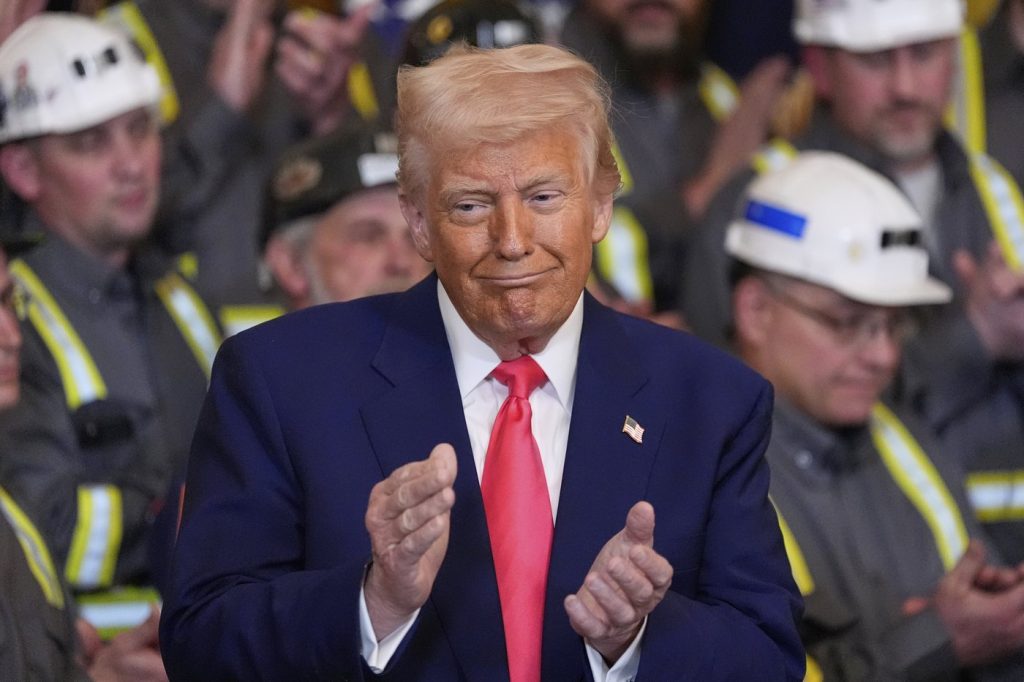On Wednesday afternoon, as the stock market surged, President Donald Trump emerged from the Oval Office following a significant policy reversal. Less than two hours prior, he announced a retreat from plans to raise tariffs on numerous U.S. trading partners, much to the relief of investors who had feared a global economic collapse. Republican Senator John Barrasso praised Trump, claiming, "You've got the markets seeing your brilliance," to which Trump exuberantly responded, "Nobody's ever heard of it."
This dramatic turn of events followed a tumultuous week that saw Trump push the global economy to the edge with new tariffs, leading to a plummet in the stock market and a reevaluation of international trade relationships. The president had initially proposed what would have been America's most extensive tax hike since World War II in a highly publicized Rose Garden ceremony. However, just a week later, he backtracked and rolled back most tariffs in a surprising post on his social media platform.
Despite Trump's assertion of being "flexible," ambiguity remained as trade negotiations were still in progress. Although his bold moves had prompted other nations to appeal for reconsideration, no new trade agreements were established. The uncertainty regarding U.S. leadership and the impact on companies reliant on global supply chains raised alarm among business leaders and investors alike. The situation further fueled anxiety for everyday Americans who depend on the stock market for their retirement savings.
The situation escalated when Trump imposed blanket tariffs of 10% on numerous nations, including an unprecedented 125% on imports from China. The tariffs also encompassed vital trading partners: 25% on Canada and Mexico, along with similar rates on vehicles, steel, and aluminum imports. Other tariffs targeting countries like Japan, South Korea, and the European Union were temporarily paused for 90 days to facilitate ongoing trade discussions.
As noted by William Reinsch, a former U.S. trade official, these events intensified the prevailing atmosphere of uncertainty. Although the freeze of certain tariff increases was welcomed, the prospect of sudden policy shifts left many wondering if Trump could reverse course once again. His unpredictable approach towards international trade has drawn skepticism, particularly from mainstream economists who view the deficit concerns with less urgency.
Trump's long-standing obsession with trade deficits and tariffs came to a head during an announcement on "Liberation Day," when he proposed significant tariffs across several nations—ranging from 32% for Thailand to 49% for Cambodia. Yet economists and analysts were bewildered, especially at the unexpected tariffs on areas like Heard and McDonald Islands, which have minimal economic significance.
Following the tariff announcements, the markets faced turmoil, recording their steepest drop since the COVID-19 pandemic began. This disarray persisted as Trump attended social engagements in Florida over the weekend, claiming, "The markets are going to boom" despite the reality of market losses.
As the backlash grew, tensions arose within Trump's administration, particularly with influential figures like billionaire entrepreneur Elon Musk, who criticized the tariffs for raising costs on his electric vehicle manufacturing. This internal conflict manifested publicly, revealing a stark divide among Trump's closest advisers. Some Republican lawmakers also began to voice concerns about the implications of the tariffs and considered supporting legislation to limit executive power over tariff imposition.
Ultimately, amidst ongoing pressure, Trump reversed some of the tariffs, leading to another rally in the stock market. However, the mixed messages from the administration and contradicting statements from Trump himself led to confusion regarding the true motivation behind the reversal—whether it stemmed from strategic policy or immediate market reactions. Trump maintained a confident demeanor, joking about financial gains while mingling with racing industry executives at the White House.
In the rapidly evolving landscape of international trade, accusations of mismanagement and amateur tactics from within the government have left U.S. economic strategies uncertain. As negotiations proceed, the enduring volatility in the market suggests that Trump's trade approach may continue to cause ripples far beyond his immediate administration.










